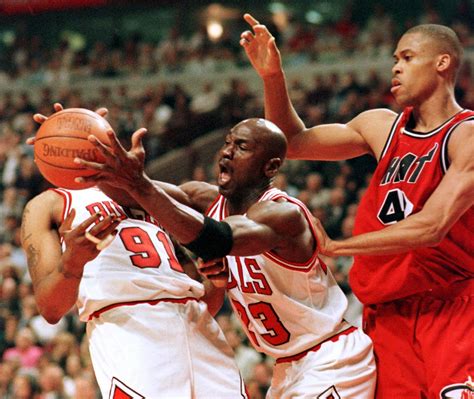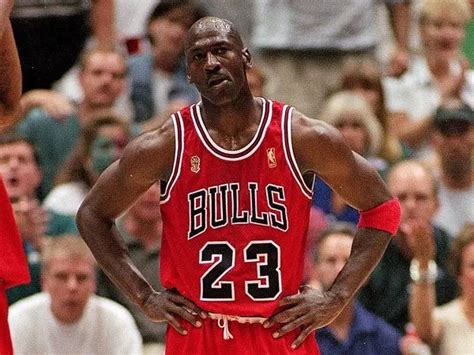
Michael Jordan’s relentless competitive drive, a defining characteristic of his legendary basketball career, has also created a distance between him and others, a consequence he acknowledges stems from his inability to “close the competitive fire.” In a recent interview with Cigar Aficionado, Jordan opened up about the personal cost of his unwavering commitment to winning, admitting that it has made it difficult to form close relationships and often isolates him from those who might perceive his intensity as intimidating.
Michael Jordan, arguably the greatest basketball player of all time, has long been celebrated for his unmatched competitive spirit. This fire, which fueled six NBA championships, five MVP awards, and countless other accolades, has also cast a long shadow over his personal life. In a candid interview, Jordan discussed how his relentless pursuit of excellence has, at times, hindered his ability to connect with others on a deeper level.
“I can’t close the competitive fire,” Jordan admitted to Cigar Aficionado. This statement encapsulates the core of his dilemma. The same attribute that propelled him to the pinnacle of athletic achievement also presents a barrier to genuine connection. His intensity, honed over years of demanding practices and high-stakes games, remains an intrinsic part of his personality, making it challenging to simply switch it off when off the court or away from the business arena.
Jordan elaborated on the perception that others have of him, acknowledging that his competitive nature can be intimidating. “I’ve been told that,” he said, suggesting an awareness of how his drive is received. This acknowledgment reflects a certain degree of self-awareness and understanding of the impact his persona has on those around him. It highlights the complexity of being Michael Jordan – an icon whose every move is scrutinized and whose competitive spirit is both admired and potentially feared.
The article further delved into the challenges Jordan faces in navigating relationships given his overwhelming fame and intense personality. While he cherishes his close circle of friends and family, the broader world often sees him through the lens of his on-court persona, a figure defined by relentless ambition and an unyielding desire to win. This can create a sense of distance, as people may hesitate to approach him authentically, unsure of how to interact with the legend.
Jordan’s competitive spirit is not merely a desire to win; it’s a deeply ingrained aspect of his identity. From his early days competing against his older brother, Larry, to his battles against NBA rivals, competition has always been a driving force in his life. This constant striving for improvement and dominance shaped not only his basketball career but also his approach to business and other endeavors. As the owner of the Charlotte Hornets and a successful entrepreneur, Jordan brings the same intensity and focus to these ventures, ensuring that he remains a formidable presence in any arena he enters.
However, this relentless pursuit of excellence comes at a cost. The pressure to maintain his image, the constant scrutiny from the media, and the expectations of fans all contribute to a sense of isolation. While Jordan has learned to navigate these challenges, it’s clear that his competitive fire, while a source of strength, can also be a source of loneliness.
The interview offers a rare glimpse into the personal life of a man who has often been portrayed as larger than life. It reveals the human side of Michael Jordan, a man grappling with the complexities of fame, success, and the enduring impact of his competitive spirit. He is not just a basketball icon; he is a person with vulnerabilities and challenges, just like anyone else.
The Cigar Aficionado interview provides a nuanced perspective on Jordan’s personality, going beyond the highlight reels and championship trophies to explore the inner workings of a man who has dedicated his life to achieving greatness. It underscores the idea that even the most successful individuals face personal struggles and that true fulfillment comes from finding balance and connection amidst the pressures of life.
In conclusion, Michael Jordan’s admission that his “competitive fire” keeps him distant from others offers a compelling insight into the complexities of success. It is a reminder that even the most celebrated figures face personal challenges and that the pursuit of greatness can sometimes come at a cost. The interview highlights the importance of understanding the human side of icons and recognizing that their achievements are often accompanied by personal sacrifices and struggles. Jordan’s story serves as a poignant reminder that true fulfillment lies not only in achieving external success but also in cultivating meaningful connections and finding balance in life. His enduring legacy will not only be remembered for his on-court dominance, but also for his willingness to share his vulnerabilities and reflect on the impact of his competitive spirit.
Frequently Asked Questions (FAQ)
1. How does Michael Jordan describe the impact of his competitive drive on his relationships?
Michael Jordan admits that his “competitive fire” often keeps him distant from others. He recognizes that his intense focus and relentless pursuit of excellence can be intimidating, creating a barrier to genuine connection. He acknowledges the difficulty in “closing the competitive fire,” implying that it’s an intrinsic part of his personality that is challenging to switch off.
2. What was the context of Michael Jordan’s statements about his competitive nature?
Jordan made these statements in an interview with Cigar Aficionado. The interview delved into various aspects of his life, including his basketball career, business ventures, and personal relationships. The discussion about his competitive drive emerged as part of a broader reflection on his life experiences and the challenges he has faced as a result of his fame and success.
3. Does Michael Jordan feel he has made sacrifices in his personal life due to his competitive nature?
While not explicitly stating he regrets anything, the article implies that Jordan acknowledges a cost to his intense competitiveness. He recognizes that it has contributed to a sense of distance from others, and that his relentless focus on winning has likely impacted his ability to form deeper relationships. The interview suggests a degree of introspection and awareness of the potential trade-offs between professional success and personal fulfillment.
4. How does the article portray Michael Jordan’s awareness of others’ perceptions of him?
The article suggests that Jordan is aware of how his competitive nature is perceived by others. He acknowledges being told that he can be intimidating, indicating an understanding of the impact his persona has on those around him. This awareness reflects a certain degree of self-awareness and understanding of the complexities of his public image.
5. Beyond basketball, how does Michael Jordan’s competitive spirit manifest in his other endeavors?
Jordan’s competitive spirit extends beyond basketball to his business ventures and ownership of the Charlotte Hornets. He brings the same intensity and focus to these endeavors, ensuring that he remains a formidable presence in any arena he enters. This consistent drive for excellence underscores that his competitive nature is not limited to his athletic career but is a fundamental aspect of his personality.
Expanded Article: The Price of Greatness: Michael Jordan’s Competitive Fire and its Impact on Relationships
Michael Jordan’s unrelenting competitive drive, a hallmark of his unparalleled basketball career, has ironically created a chasm between him and others, a consequence he openly acknowledges stems from his inability to “close the competitive fire.” In a recent, revealing interview with Cigar Aficionado, Jordan peeled back layers of his public persona, offering a glimpse into the personal cost of his unwavering commitment to winning. He admitted that this intensity has often made it difficult to forge deep, meaningful relationships, isolating him from individuals who may perceive his drive as intimidating or unapproachable.
This admission underscores a crucial aspect of Jordan’s legacy: the inherent tension between achieving unparalleled success and maintaining a fulfilling personal life. For decades, Jordan has been synonymous with competitive excellence, a figure whose relentless pursuit of victory inspired millions. However, the interview offers a more nuanced perspective, revealing the challenges and sacrifices that accompanied his ascent to the pinnacle of sports and business.
The phrase “I can’t close the competitive fire” encapsulates the heart of Jordan’s predicament. This isn’t merely a boast or a statement of unwavering ambition; it’s a confession of an intrinsic personality trait that defines his existence. The very quality that propelled him to greatness – his unyielding desire to win at all costs – simultaneously acts as a barrier, hindering his ability to connect with others on a more intimate level.
Jordan’s competitive fire was forged in the crucible of relentless training, high-stakes games, and constant pressure to perform. From his early days playing against his older brother, Larry, in their backyard, to the intense battles he faced against rival teams in the NBA Finals, competition has been the defining force in his life. This constant striving for improvement and dominance shaped not only his athletic career but also his approach to business and other endeavors.
As the owner of the Charlotte Hornets and a successful entrepreneur with a sprawling business empire, Jordan brings the same intensity and laser-like focus to these ventures. He demands excellence from himself and those around him, pushing boundaries and relentlessly pursuing success. This unwavering commitment has undoubtedly contributed to his achievements in the business world, but it also reinforces the perception that he is a demanding and uncompromising figure.
The article highlights Jordan’s awareness of how others perceive him. He acknowledges being told that his competitive nature can be intimidating, suggesting a level of self-reflection and understanding of the impact he has on those around him. This acknowledgment reveals the complex reality of being Michael Jordan – an icon whose every move is scrutinized and whose competitive spirit is both admired and potentially feared.
The challenges Jordan faces in navigating relationships are further compounded by his overwhelming fame and the constant attention he receives from the media and the public. While he values his close circle of friends and family, the broader world often views him through the prism of his on-court persona – a figure defined by relentless ambition and an insatiable hunger for victory. This can create a sense of distance, as people may hesitate to approach him authentically, unsure of how to interact with the legend.
Moreover, the pressure to maintain his image, the constant scrutiny from the media, and the expectations of fans all contribute to a sense of isolation. Jordan has spent decades cultivating a reputation for excellence, and he is acutely aware of the need to uphold that image. This pressure can make it difficult to let his guard down and connect with others on a more personal level.
The interview offers a rare glimpse into the personal life of a man who has often been portrayed as superhuman. It reveals the human side of Michael Jordan – a man grappling with the complexities of fame, success, and the enduring impact of his competitive spirit. He is not simply a basketball icon; he is a person with vulnerabilities and challenges, just like anyone else.
This candid discussion prompts a deeper reflection on the price of greatness. While Jordan’s achievements are undeniably remarkable, the interview highlights the potential trade-offs between professional success and personal fulfillment. It raises questions about the sacrifices individuals make in pursuit of their ambitions and the impact those sacrifices have on their relationships and overall well-being.
The Cigar Aficionado interview provides a nuanced perspective on Jordan’s personality, moving beyond the highlight reels and championship trophies to explore the inner workings of a man who has dedicated his life to achieving greatness. It underscores the idea that even the most successful individuals face personal struggles and that true fulfillment comes from finding balance and connection amidst the pressures of life.
Jordan’s story serves as a poignant reminder that true fulfillment lies not only in achieving external success but also in cultivating meaningful connections and finding balance in life. His enduring legacy will not only be remembered for his on-court dominance but also for his willingness to share his vulnerabilities and reflect on the impact of his competitive spirit.
The intensity that fueled his legendary basketball career, a driving force behind six NBA championships and countless individual accolades, is a double-edged sword. While it propelled him to the pinnacle of athletic achievement, it has simultaneously created barriers in his personal life, making it difficult to connect with others on a deeper, more intimate level. The interview suggests that Jordan recognizes this tension and is grappling with the complexities of balancing his competitive drive with his desire for meaningful relationships.
Further analyzing the context of Jordan’s statement, it’s important to consider the environment in which it was made. Cigar Aficionado, while a magazine focused on cigars and the lifestyle associated with them, often features in-depth interviews with prominent figures from various fields. These interviews tend to be more relaxed and conversational than traditional news interviews, allowing for greater candor and self-reflection. This setting likely contributed to Jordan’s willingness to open up about the personal challenges he faces as a result of his competitive nature.
It’s also crucial to consider the evolution of Jordan’s public persona over the years. In his early career, he was often portrayed as the quintessential athlete – a fierce competitor with an unwavering focus on winning. However, as he has matured and transitioned into the business world, he has gradually revealed more of his personal side. The interview with Cigar Aficionado is a continuation of this trend, offering a more nuanced and human portrayal of Michael Jordan.
Moreover, Jordan’s competitive fire has likely been intensified by the constant comparisons to other legendary athletes. Throughout his career, he has been measured against the likes of Wilt Chamberlain, Bill Russell, and Kareem Abdul-Jabbar. This constant pressure to outperform his predecessors and maintain his status as the greatest of all time has undoubtedly contributed to his relentless pursuit of excellence.
The article also subtly touches upon the potential loneliness that can accompany immense success. While Jordan is surrounded by people – family, friends, business associates, and fans – it can be challenging to find genuine connection amidst the constant attention and adulation. It’s possible that his competitive fire, while a source of strength, also serves as a shield, protecting him from vulnerability and preventing him from forming deeper relationships.
The interview also raises questions about the role of role models and the pressures they face. Jordan has long been considered a role model for aspiring athletes and young people around the world. However, the interview suggests that even role models are not immune to personal struggles and that the pursuit of greatness can come at a cost. This is a valuable lesson for young people who may be tempted to idolize celebrities and athletes without understanding the challenges they face behind the scenes.
Ultimately, the Cigar Aficionado interview provides a valuable and insightful look into the life of Michael Jordan. It reveals the complexities of a man who has achieved unparalleled success but who also grapples with the challenges of balancing his competitive drive with his desire for meaningful relationships. It is a reminder that even the most celebrated figures are human and that true fulfillment comes from finding balance and connection amidst the pressures of life.
In addition to the impact on personal relationships, Jordan’s competitive fire likely influences his leadership style as well. As the owner of the Charlotte Hornets, he undoubtedly expects a high level of performance from his players and staff. While this can be a positive influence, motivating them to strive for excellence, it can also create a demanding and high-pressure environment. It’s possible that some individuals may find it challenging to work for someone with such an intense competitive drive.
Furthermore, Jordan’s competitive nature may affect his decision-making process in both business and sports. He is likely to be more risk-averse than others, preferring to make calculated moves that maximize his chances of success. This can be an advantage in some situations, but it can also lead to missed opportunities if he is unwilling to take bold or unconventional approaches.
The interview also prompts reflection on the societal values that contribute to the glorification of competition. In many cultures, winning is highly valued, and individuals are often judged based on their achievements. This can create a climate of intense pressure, where people feel compelled to constantly strive for success, even at the expense of their personal well-being. Jordan’s story serves as a cautionary tale, reminding us of the importance of finding balance and prioritizing meaningful connections over relentless competition.
The conversation surrounding Jordan’s comments also brings up the larger issue of athletes and mental health. The immense pressure to perform at the highest level, coupled with the constant scrutiny from the media and the public, can take a significant toll on athletes’ mental and emotional well-being. Jordan’s willingness to discuss the challenges he faces as a result of his competitive nature is a positive step towards destigmatizing mental health issues in the world of sports.
His candor also allows for a discussion about redefining success. Often, success is measured by external achievements – championships, awards, and financial wealth. However, Jordan’s story suggests that true success encompasses more than just external validation. It also includes personal fulfillment, meaningful relationships, and a sense of inner peace. Perhaps it’s time to reconsider what it means to be truly successful and to prioritize values that promote well-being and connection over relentless competition.
The lasting impact of Michael Jordan extends far beyond the basketball court. His story serves as a powerful reminder that even the most celebrated figures are human and that true fulfillment comes from finding balance and connection amidst the pressures of life. His willingness to share his vulnerabilities and reflect on the impact of his competitive spirit is a testament to his enduring legacy as not only a basketball icon but also a complex and multifaceted individual.
The scrutiny and expectations placed upon Jordan from a young age likely contributed to his development of such a strong competitive drive. He was constantly under pressure to perform, to exceed expectations, and to live up to the hype. This pressure can be both a motivator and a burden, and it undoubtedly shaped his personality and his approach to life.
It’s important to consider the cultural context in which Jordan rose to prominence. In the 1980s and 1990s, professional sports were becoming increasingly commercialized, and athletes were under greater pressure to perform and to market themselves. Jordan was at the forefront of this trend, and he became one of the most recognizable and marketable athletes in the world. This added pressure likely intensified his competitive fire and his desire to maintain his position at the top.
Finally, it’s worth noting that Jordan’s competitive drive is not necessarily a negative trait. In many ways, it is what made him such a great basketball player. His relentless pursuit of excellence pushed him to constantly improve and to overcome obstacles. It is only when this competitive drive becomes unbalanced and begins to negatively impact his personal life that it becomes a problem. The interview with Cigar Aficionado suggests that Jordan is aware of this potential imbalance and is actively grappling with the challenges it presents.









